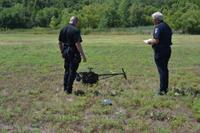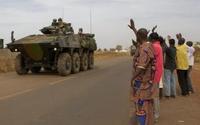-
WOT distorting focus, resource allocation of U.S. intelligence community: experts
The U.S. Intelligence Advisory Board, a panel of fourteen highly regarded and experienced experts, many of whom past holder of high-level national security positions, has submitted a secret report to President Obama in which they say that the intense, 12-year focus of the intelligence community on finding and fighting terrorism has distorted the priorities, resource allocation, and training within that community. Former Senator David Boren, a member of the panel, asks: “in the long run, what’s more important to America: Afghanistan or China?”
-
-
U.S. infrastructure grade raised from D to a D+, but problems loom
The American Society of Civil Engineers (ASCE), in its just-released 2013 Report Card for America’s Infrastructure, gave the U.S. infrastructure an overall grade of D+, showing slight progress from the D in the last Report Card issued in 2009. The Report Card concludes that to raise the grades and get U.S. infrastructure to an acceptable level, a total investment of $3.6 trillion is needed by 2020. Currently, only about $2 trillion in infrastructure spending is projected, leaving a shortfall of approximately $1.6 trillion.
-
-
Lawmakers question DHS about cutting costs
On Tuesday, during a hearing on inspector general recommendations, House lawmakers pointedly questioned DHS and Defense Department (DoD) officials on departmental efforts to contain costs.
-
-
FAA gives Arlington, Texas police permission to use UAVs

The Federal Aviation Administration (FAA) has given the Arlington (Texas) Police Department permission to use two small helicopter UAVs. The FAA did lay out a set of rules for the police department to follow when using the drones.
-
-
Sharia law imposed in some rebel-controlled areas in Syria
The Syrian revolution has mutated from a spontaneous uprising against the authoritarian rule of the Assad family into a full-scale war, and is now changing yet again – into what appears to be a systematic, coordinated effort to impose strict Sharia Islamic law in those parts of Syria which have come under the control of the Jihadi elements in the anti-Assad coalition.
-
-
Alabama wants to teach you how to deal with active-shooter situations
The Alabama Department of Homeland Security (ADHS) has paid for a series of billboards, informing the public there is a video on how to deal with an active shooter situation in a work place or other public settings.
-
-
Concerns about Mali’s future as French prepare to leave

The French military campaign against Islamic militants in northern Mali has killed many of the Jihadists and drove the rest of them from the region’s cities to hideouts in the mountains. Now, as France is getting set to pull its soldiers out, questions are being raised about the ability of the African coalition forces to patrol the vast territory and keep the Islamists at bay. UN officials now consider the formation of a heavily armed rapid-response force of up to 10,000 troops, mostly from Chad, to intervene in Mali in the event the peace keeping force there is unable to deal with the Islamist threat.
-
-
NRC rejects plan for Maryland nuclear reactor
A plan to build a third nuclear reactor in southern Maryland was postponed last week as the Nuclear Regulatory Commission (NRC) upheld an earlier decision to squash the project. the primary reason for the rejection is the fact that the applicant’s parent company, Electricite de France, is 85 percent owned by the French government. U.S. law forbids foreign ownership of U.S. nuclear reactors.
-
-
Widely used FBI surveillance method ruled unconstitutional

A national security letters (NSLs) is an administrative subpoena which allows the FBI to ask Internet companies and communication service providers to turn over subscriber information on American customers, while prohibiting the providers from informing these customers that their personal information has been turned over to the FBI. Since the 9/11 attacks, the bureau has issued an average of 50,000 NSLs a year. A federal judge in California says this is “rendering the statute impermissibly overbroad.”
-
-
Ex-DHS employee sues DHS Wyoming office
A Wyoming DHS employee s suing the Wyoming’s Office of Homeland Security for what he considers to be arbitrary change in his work conditions, changes which took a toll on his finances and family life.
-
-
Fighting gun restrictions on the international scene

The National Rifle Association (NRA) has taken its campaign against measures aiming to tighten gun control to the international level. The organization has been leading a campaign fight a UN treaty designed to restrict the flow of arms to conflict zones. The treaty is likely to pass, but the NRA appears to have enough support in the Senate to prevent ratification.
-
-
A better cyanide antidote for terrorist attacks, mass casualty events
The current procedure for treating cyanide poisoning requires highly trained paramedical personnel and takes time. Cyanide, however, is a fast-acting poison. In a situation involving mass casualties, only a limited number of victims could be saved with IV medication. Scientists are reporting discovery of a promising substance that could be the basis for development of a better antidote for cyanide poisoning.
-
-
U.S. to bolster missile defense to meet North Korean threat
The United States is bolstering the country’s missile defense after a series of explicit nuclear threats from North Korea. The Pentagon will announce Monday that it is deploying fourteen additional ground-based interceptors at missile silos in Alaska and California.
-
-
Questions raised about Iron Dome success
MIT professor Ted Postol is at it again: in 1992 he successfully challenged the claims made by the United States, Israel, and Raytheon about the effectiveness of the Patriot missiles in intercepting Iraqi SCUD missiles fired at Israel, and now he is raising similar questions about the accuracy of claims made about the effectiveness of Israel’s Iron Dome anti-rocket system during the 10-day Israel-Hamas war last November, a war code-named Pillar of Defense.
-
-
More state commit to compliance with REAL ID
DHS reports that six more states have become complaint with the REAL ID Act, meaning that the act is finally making some headway after eight years of debating and delays. Nineteen states are now in compliance with the Act, and twenty-six more have committed to meet the standards before the deadline. The Act, passed in 2005, had an original compliance deadline of 2008, but that deadline has been extended several times, and is now 1 December 2014.
-
More headlines
The long view
Factories First: Winning the Drone War Before It Starts
Wars are won by factories before they are won on the battlefield,Martin C. Feldmann writes, noting that the United States lacks the manufacturing depth for the coming drone age. Rectifying this situation “will take far more than procurement tweaks,” Feldmann writes. “It demands a national-level, wartime-scale industrial mobilization.”
No Nation Is an Island: The Dangers of Modern U.S. Isolationism
The resurgence of isolationist sentiment in American politics is understandable but misguided. While the desire to refocus on domestic renewal is justified, retreating from the world will not bring the security, prosperity, or sovereignty that its proponents promise. On the contrary, it invites instability, diminishes U.S. influence, and erodes the democratic order the U.S. helped forge.
Fragmented by Design: USAID’s Dismantling and the Future of American Foreign Aid
The Trump administration launched an aggressive restructuring of U.S. foreign aid, effectively dismantling the United States Agency for International Development (USAID). The humanitarian and geopolitical fallout of the demise of USAID includes shuttered clinics, destroyed food aid, and China’s growing influence in the global south. This new era of American soft power will determine how, and whether, the U.S. continues to lead in global development.
Water Wars: A Historic Agreement Between Mexico and US Is Ramping Up Border Tension
As climate change drives rising temperatures and changes in rainfall, Mexico and the US are in the middle of a conflict over water, putting an additional strain on their relationship. Partly due to constant droughts, Mexico has struggled to maintain its water deliveries for much of the last 25 years, deliveries to which it is obligated by a 1944 water-sharing agreement between the two countries.
How Disastrous Was the Trump-Putin Meeting?
In Alaska, Trump got played by Putin. Therefore, Steven Pifer writes, the European leaders and Zelensky have to “diplomatically offer suggestions to walk Trump back from a position that he does not appear to understand would be bad for Ukraine, bad for Europe, and bad for American interests. And they have to do so without setting off an explosion that could disrupt U.S.-Ukrainian and U.S.-European relations—all to the delight of Putin and the Kremlin.”
How Male Grievance Fuels Radicalization and Extremist Violence
Social extremism is evolving in reach and form. While traditional racial supremacy ideologies remain, contemporary movements are now often fueled by something more personal and emotionally resonant: male grievance.
